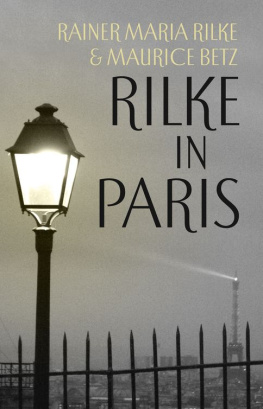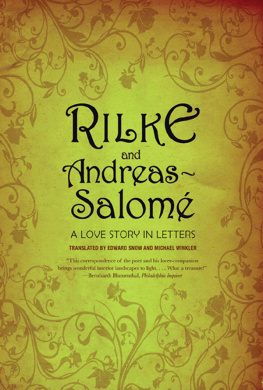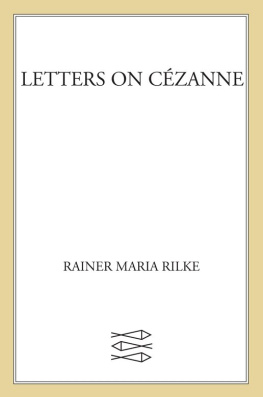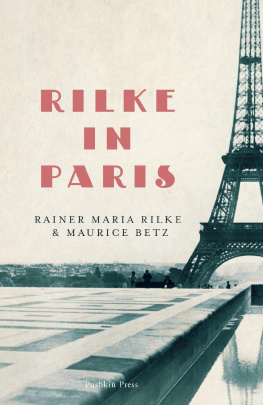Adjusting type size may change line breaks.
Landscape mode may help to preserve line breaks.
In Translations by M. D. Herter Norton
Letters to a Young Poet
Sonnets to Orpheus
Wartime Letters to Rainer Maria Rilke
Translations from the Poetry of Rainer Maria Rilke
The Lay of the Love and Death of Cornet Christopher Rilke
The Notebooks of Malte Laurids Brigge
Stories of God
Translated by Jane Bannard Greene and M. D. Herter Norton
Letters of Rainer Maria Rilke. Volume One, 18921910
Letters of Rainer Maria Rilke. Volume Two, 19101926
Translated by David Young
Duino Elegies
In Various Translations
Rilke on Love and Other Difficulties. Translations and
Considerations of Rainer Maria Rilke
Compiled by John J. L. Mood
Translated by Edward Snow and Michael Winkler
Diaries of a Young Poet

If only we arrange our life according
to that principle which counsels us
that we must always hold to the difficult,
then that which now still seems to us
the most alien will become what we
most trust and find most faithful.
T he prose selections included here are taken from Letters to a Young Poet, rev. ed., trans. by M. D. Herter Norton (New York: W. W. Norton, 1954), Letters of Rainer Maria Rilke, 2 vols., trans. by Jane Bannard Greene and M. D. Herter Norton (New York: W. W. Norton, 1945, 1948), The Notebooks of MalteLaurids Brigge, trans. by M. D. Herter Norton (New York: W. W. Norton, 1949), Selected Works, vol. I, Prose, trans. by G. Craig Houston (London: Hogarth, 1954), Letters to Benvenuta, trans. by Heinz Norden (London: Hogarth, 1953), and Letters to Merline, trans. by Violet M. MacDonald (London: Methuen, 1951).
All poetic selections included here are my translations from the definitive collection, Smtliche Werke (Insel-Verlag), vol. I (1955), vol. II (1956). In the German text, one will find occasional brackets. These indicate words or lines later canceled by Rilke.
Some of my translations, as well as earlier versions and portions thereof, have appeared in the following journals: New York Quarterly, Philosophy Today, Encounter, Bucks County Gazette, and South.

also to
S. A. S. Principe Raymondo della Torre e Tasso
IL CASTELLO DUINO
&
Frau Greta Lautenburg
CHTEAU DE MUZOT
and to
Reinhold Schlieper
RILKE
ON LOVE AND OTHER DIFFICULTIES
Translations and Considerations of
Rainer Maria Rilke

John J. L. Mood


To S.R.H. & F.W.P.
For S.L.E.
CONTENTS
II Summer, which you
so suddenly are IV You dont know
towers
You declare you know
loves nights?
By the
sun-surrounded road (Since I wrote you,
sap sprang free
Play the deaths, the single
ones, quickly Strong star,
which needs not the help
After such long experience let
house
Force of
Gravity Somewhere blooms the
blossom of parting Give me,
oh earth, pure unmingling
Now it would be time that gods should step
out
Come
you, you last one, whom I avow
VII. THE DIFFICULTY OF DYING:
RILKES SELF-COMPOSED EPITAPH
PROLOGUE
I t is my conviction that, by any measure, the two greatest writers of the twentieth century are James Joyce (18821941) and Rainer Maria Rilke (18751926), neither of whom came close to winning the Nobel Prize for Literature. I mention that last fact because I too find it difficult to say anything appropriate about either of them, though no doubt for different reasons than those of the Nobel Committee. Frequently it takes time to appreciate more fully and appropriately a great writers work. In fact, the closer I am to a writers work and the more I love it, just so the more difficult is it for me to speak of it. Because of Rilkes importance to my own biography, I find it most difficult of all to speak of him. But as there is a time to be silent, so there is a time to speak. And I have become increasingly compelled to speak Rilkes work. After a decade and a half of living with it, speaking that work has become an inner necessity for me.
This conflict between the difficulty of speaking and the necessity for doing so only slowly produced words. The first result for me was a selection dealing with love from Rilkes letters. I arranged these selections into what seemed to me some order under the lackadaisical title Notes on Love, mimeographed it and gave copies to friends, students, loved ones, and others. I have no idea how many copies of it I handed out over the period of nearly a decade. But those were Rilkes words, not mine, though my own sense of Rilke and my own sensibility in general surely manifested themselves in the selection and arrangement of the essay.
The second result was occasional reference to Rilke and translation of lines of his poetry in articles of mine on other topics. It was as though I could only speak his work indirectly, in other contexts. This too continued over the years.
Then, some time back, I suddenly found myself feverishly translating some of the last poems of Rilke. I spent nearly a month at that task, which overrode all my other responsibilities at the time. Halfway through that seizure I realized what had precipitated it: I had just finished teaching, for the second or third time, Rilkes profound and beautiful novel, The Notebooks of Malte Laurids Brigge. But the seizure soon passed, I put the poems away, and there was another pause, another silence.
Finally, while recently rereading some of Rilke again (an almost constant activity of mine), the necessity became overpowering and I had to speak. This book is the result. It includes all the previously mentioned material, somewhat revised, plus further translations and short essays. I am not satisfied with it. My translations are, of course, inadequate. My own words seem partial. I have not found it possible to speak the deeper dimensions of my sense of Rilke, which is somehow very close to my ownmost biography and being. Here are only fragments, portionsemphasizing elements from my own experience of Rilke which seem to have been neglected by others or which are less private favorite moments of mine.
However inadequate, these words are offered in love to other Rilke-lovers, who no doubt have their own more private and secret moments, as do Imoments of awesome mystery, impossible to speak. It is for the possibility of further such moments, full of serenity and dread, that this book is presented.
I first made the following selection almost ten years ago. Around 1960 I discovered Simone de Beauvoirs The Second Sex and immediately became a militant feminist, as we were called in those days. At the same time, I had been reading Rilke casually for several years. That reading became more serious and comprehensive, and as it did I became increasingly aware that Rilke had not only anticipated Mlle. de Beauvoir by fifty years but had also gone far, far beyond her, and all the other womens liberation advocates, as they are now called, as well. As good as her monumental study was, it stayed finally at the level of a socio-politicophysiological analysis of Western woman. And it was finally a masculine book with the masculine goal of freedom and equality as its primary focus. Which is not to gainsay either its contemporary relevance or final importance. But I have an incurably metaphysical mind, and I was not finally satisfied with her book. It unwittingly raised more questions than it answered, and the questions raised seemed somehow the deeper ones: questions of the ontology of the sexes, of what finally and at the deepest level the feminine is, of what being-human is, of what, most importantly, love is.
Next page







